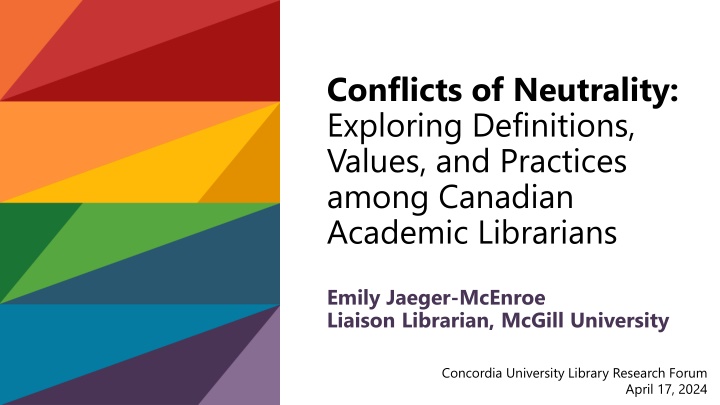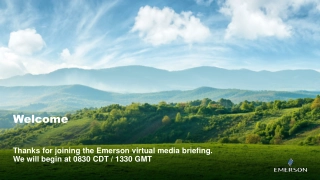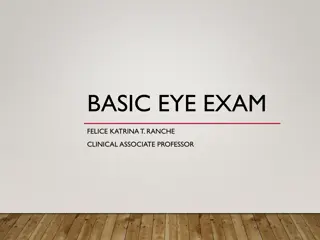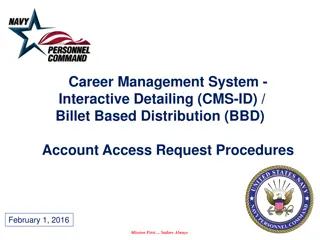
Exploring Neutrality Among Canadian Academic Librarians
This study delves into the definitions, values, and practices of neutrality in the context of Canadian academic librarianship. It examines how neutrality is defined, valued, and implemented by professionals in this field, shedding light on the importance of maintaining a balance between personal convictions and professional duties. The research questions focus on defining neutrality, assessing its significance as a professional value, and exploring how academic librarians actively practice neutrality in their workplace. The sampled population includes various academic institutions across Canada, providing a diverse perspective on this critical aspect of librarianship.
Download Presentation

Please find below an Image/Link to download the presentation.
The content on the website is provided AS IS for your information and personal use only. It may not be sold, licensed, or shared on other websites without obtaining consent from the author. If you encounter any issues during the download, it is possible that the publisher has removed the file from their server.
You are allowed to download the files provided on this website for personal or commercial use, subject to the condition that they are used lawfully. All files are the property of their respective owners.
The content on the website is provided AS IS for your information and personal use only. It may not be sold, licensed, or shared on other websites without obtaining consent from the author.
E N D
Presentation Transcript
Conflicts of Neutrality: Exploring Definitions, Values, and Practices among Canadian Academic Librarians Emily Jaeger-McEnroe Liaison Librarian, McGill University Concordia University Library Research Forum April 17, 2024
Neutrality, personal integrity and professional skills From the Canadian Federation of Library Associations (CFLA) Code of Ethics and the International Federation of Library Association s (IFLA) Code of Ethics for Librarians and other Information Workers Librarians and other information workers are strictly committed to neutrality and an unbiased stance regarding collection, access and service. Neutrality results in the most balanced collection and the most balanced access to information achievable. Librarians and other information workers define and publish their policies for selection, organisation, preservation, provision, and dissemination of information. Librarians and other information workers distinguish between their personal convictions and professional duties. They do not advance private interests or personal beliefs at the expense of neutrality. Librarians and other information workers have the right to free speech in the workplace provided it does not infringe the principle of neutrality towards users. Librarians and other information workers counter corruption directly affecting librarianship, as in the sourcing and supply of library materials, appointments to library posts and administration of library contracts and finances. Librarians and other information workers strive for excellence in the profession by maintaining and enhancing their knowledge and skills. They aim at the highest standards of service quality and thus promote the positive reputation of the profession.
Research Questions How is neutrality defined by academic librarians? Do academic librarians value neutrality as a professional value? How are academic librarians practicing neutrality in the workplace?
Sampled population Canadian Association of Professional Academic Librarians (CAPAL/ACBES) listserv Canadian Association of Research Libraries (CARL) member institutions University of Alberta University of British Columbia University of Calgary University of Manitoba University of Regina University of Saskatchewan Simon Fraser University University of Victoria Brock University Carleton University University of Guelph McMaster University University of Ottawa Queen s University Toronto Metropolitan University University of Toronto University of Waterloo Western University University of Windsor York University Concordia University Universit Laval McGill University Universit de Montr al Universit du Qu bec Montr al Universit de Sherbrooke Dalhousie University Memorial University of Newfoundland University of New Brunswick
Survey response Active from November 16, 2023 to January 22, 2024 298 reposes 179 full 119 partial Only full responses were analyzed
Defining Neutrality How is neutrality defined by academic librarians?
Neutrality is... Neither agree nor disagree Not taking sides on an issue 17% Not expressing opinions 13% Being objective 18% Lacking bias 9% -60% -40% -20% 0% 20% 40% 60% 80% Percentage of respondents Defining Neutrality
Neutrality in practice Neutrality promotes balanced collections and 46% 36% access to information Neutrality is compatible with other library values 30% 54% and goals 26% 61% Neutrality is possible -60% -40% -20% 0% 20% 40% 60% Percentage of respondents Defining Neutrality
Neutrality and ideals Librarians should be neutral in the provision 46% 45% of library services Neutrality is an important professional value in the library field 49% 39% Academic libraries should be neutral 31% 55% 58% 22% It is ethical to be neutral -60% -40% -20% 0% 20% 40% 60% Percentage of respondents Defining Neutrality
Valuing Neutrality Do academic librarians value neutrality as a professional value?
CFLA-FCAB Code of Ethics (also the IFLA Code of Ethics!) 1. Access to Information 2. Responsibilities towards individuals and society 3. Privacy, secrecy and transparency 4. Open access and intellectual property 5. Neutrality, personal integrity and professional skills 6. Colleague and employer/employee relationship
Percentage of respondents ranking value as #1 according to importance to their work as a librarian Access to Information was ranked as the #1 value by 54% of respondents Access to Information 54% Open access and Intellectual Property 3% Privacy, secrecy & transparency 3% Only 4% of respondents ranked neutrality as their #1 value Neutrality, personal integrity & professional skills 4% Responsibilities towards individuals and society 31% Colleague and employer/employee relationship 5% Valuing Neutrality
Ranking of "Neutrality, personal integrity and professional skills" 23% 22% Percentage of respondents 20% 16% 11% 4% 4% #1 #2 #3 #4 #5 #6 unranked Rank Valuing Neutrality
Relative Ranking of CFLA Values Access to Information Responsibilities towards individuals and society Neutrality, personal integrity and professional skills Privacy, secrecy and transparency Colleague and employer/employee relationship Open access and intellectual property Valuing Neutrality
Practicing Neutrality How are academic librarians practicing neutrality in the workplace?
How often respondents think about neutrality in different areas 45% 51% 50% 50% Collection development 47% 46% 29% 44% Teaching Percentage of respondents 40% 38% Reference 37% 36% Outreach 32% 32% 30% 30% 28% 28% 13% Cataloguing 13% 22% 22% 21% Policy creation and enforcement Management of spaces and equipment Management of staff and hiring Assessment of services 17% 17% 16% 15% 14% 14% 13% 13% 12% 12% 12% 11% 11% 11% 11% 10% 9% Always Often Rarely Never Practicing Neutrality
How often respondents think about neutrality in different areas I've answered that I never think about neutrality in some of these instances, because I believe it's important to prioritize EDI instead 74 Collection development 70 67 65 64 Teaching 63 Reference 52 50 # of respondents 49 47 46 I think thinking about it does not mean that it is achievable. Outreach 39 38 Cataloguing 34 30 27 Policy creation and enforcement Management of spaces and equipment Management of staff and hiring Assessment of services 25 23 22 20 20 20 20 19 19 18 17 16 16 15 15 15 15 8 I should note that I think about it in a negative sense: I always think about what I am (non-neutrally) committing to. 14 12 Always Often Rarely Never Practicing Neutrality
Scenario Questions Respondents were asked if each of the following scenarios represented a position of neutrality, and whether they would take said action. Allowing a group with white supremacist views to rent a library room for a public speaking event Buying books representing both pro-life and pro-choice positions Celebrating Indigenous Awareness week with a curated display on decolonization Displaying pride flags (i.e. LGBTQ Rainbow Flag, Trans Pride Flag, etc.) at the reference desk Helping a user find information about building bombs Practicing Neutrality
X is a neutral positon I would do X pro-life and pro-choice Indigenous Awareness week building bombs Displaying pride flags Indigenous Awareness week pro-life and pro-choice Displaying pride flags building bombs white supremacist white supremacist -100% -80% -60% -40% -20% 0% 20% 40% 60% 80% 100% -100% -80% -60% -40% -20% 0% 20% 40% 60% 80% 100% Percentage of respondents Percentage of respondents Agree Strongly agree Disagree Strongly disagree Strongly agree Practicing Neutrality Agree Disagree Strongly disagree
Neutrality and Action If everyone followed the codes of ethics exactly, we would expect people s judgements about the neutrality of a scenario and if they would do it to line up : Neutral = Do it Not Neutral = Don t do it
would do not neutral neutral not do would
Total responses to scenario questions would do not neutral neutral not do would Practicing Neutrality
Total responses to scenario questions would do not neutral neutral not do would Practicing Neutrality
Total responses to scenario questions would do 24% 27% not neutral neutral 6% 20% not do would Practicing Neutrality
Renting a room to white supremacists Display Pride Flag Not neutral + Would do Neutral + Would do Not neutral + Would not do Neutral + Would not do Buy prolife and prochoice books Information about building bombs Indigenous Awareness Week Practicing Neutrality
Renting a room to white supremacists Display Pride Flag Not neutral + Would do Neutral + Would do Not neutral + Would not do Neutral + Would not do Buy prolife and prochoice books Information about building bombs Indigenous Awareness Week Practicing Neutrality
Renting a room to white supremacists Display Pride Flag Not neutral + Would do Neutral + Would do 51% 26% 10% Not neutral + Would not do Neutral + Would not do 16% 59% 6% Buy prolife and prochoice books Information about building bombs Indigenous Awareness Week 51% 22% 7% 31% 44% 7% 13% 5% 7% 0.5% 23% Practicing Neutrality
Conclusions Academic librarians define neutrality as being more about outward appearances than an actual state of being objective Neutrality is not the most highly valued principle by academic librarians Librarians are not neutral about applying principles of neutrality: on issues related to EDIA they tend to act in ways that they do not think are neutral
Next steps Analysis of free text question responses Compare demographics Deeper statistical analysis - are these results statistically significant? Write up for publication Eventually repeat with a broader sample size?
Questions & Comments & Suggestions emily.jaeger-mcenroe@mcgill.ca



